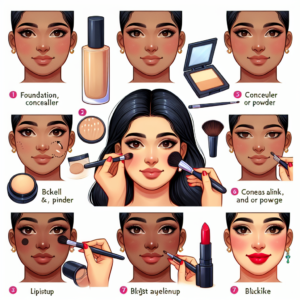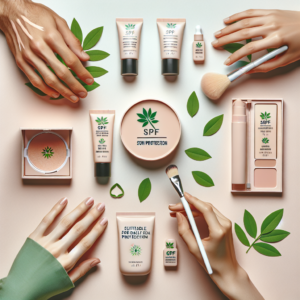
The Truth Behind Non-Cruelty Free Makeup and Vegan Claims
When you’re standing in the makeup aisle, your eyes might be drawn to labels that boast ‘cruelty-free’ or ‘vegan.’ But what do these terms really mean, especially for those of us with sensitive skin who are looking for that perfect SPF protection? It’s crucial to understand the difference, because not all products that claim to be kind to animals are kind to your skin, or the environment.
Key Difference Between Vegan and Cruelty-Free
First things first, ‘vegan’ and ‘cruelty-free’ are not interchangeable. A product labeled as vegan means it contains no animal-derived ingredients. This includes common substances like honey, beeswax, lanolin, collagen, albumen, carmine, cholesterol, and gelatin. On the flip side, cruelty-free refers to products that have not been tested on animals at any point during their production process.
However, here’s the kicker: a product can be cruelty-free but not vegan. This means the final product wasn’t tested on animals, but it may still contain animal-derived ingredients. Conversely, a vegan product might not have animal ingredients, but it could have been tested on animals. This is why understanding labels is essential.
Analyzing Ingredients: The Animal-Derived Substances in Cosmetics
Being informed about what’s actually in your cosmetics is the first step to making better choices for your skin and for the animals. Here’s a brief rundown of some common animal-derived ingredients:
-
Lanolin: A substance obtained from sheep’s wool that’s often used in skin and lip balms.
-
Carmine: A red pigment made from crushed cochineal insects, frequently found in lipsticks and blushes.
-
Gelatin: Derived from animal collagen, used as a binder in cream-based cosmetics.
Checking the ingredients list for these and other animal-derived substances is a step towards ensuring your makeup is truly vegan.

Discovering What’s Really in Your Makeup Bag
Take a moment to think about what’s in your makeup bag. Do you know what each product contains? Most importantly, do you know their impact on your sensitive skin? It’s time to take a closer look.
The Hidden Animal Byproducts in Popular Products
Many makeup products on the market contain hidden animal byproducts. For example, that shimmer in your favorite eyeshadow might be guanine, which is made from fish scales. And that smooth application of your mascara? It could be thanks to stearic acid, which is often derived from pork, beef, or sheep fats.
Understanding Labels: Deciphering the Fine Print
Understanding labels can be tricky, but it’s essential for making informed decisions. Look for certifications from reputable organizations like The Vegan Society or Leaping Bunny, which indicate that a product meets strict vegan or cruelty-free standards. Also, keep an eye out for symbols like the PETA bunny or the Certified Vegan logo.
Tip: When in doubt, visit the brand’s website or contact their customer service for clarification on their animal testing policies and ingredient sourcing.
Besides that, remember that marketing terms like ‘natural’ or ‘green’ do not necessarily mean a product is vegan or cruelty-free. Always read the fine print to ensure your makeup aligns with your ethical and skin care values.
Stay tuned for more insights on how to embrace a vegan makeup routine, including the best SPF options for sensitive skin. And don’t forget to follow and repost our Facebook page at Pure Cream Hue for more tips and updates on vegan beauty.
Top Vegan Makeup Brands with SPF for Sensitive Skin
Finding makeup that’s both vegan and suitable for sensitive skin can be a daunting task. But fear not! There are brands out there that have taken up the mantle to provide products that are gentle on the skin and kind to animals. Here are a few standout brands that offer vegan makeup with SPF protection:
-
Derma E: Known for their sun protection products, Derma E offers a range of vegan sunscreens and BB creams with SPF.
-
Suntegrity: A brand that prides itself on non-toxic, vegan, and cruelty-free sun care, including tinted moisturizers with SPF.
-
ILIA Beauty: They provide a selection of vegan-friendly makeup products with SPF, such as their Super Serum Skin Tint SPF 40.
Each of these brands has been carefully selected to ensure that they adhere to vegan standards without compromising on sun protection for those with sensitive skin.
How to Transition to a Vegan Makeup Routine
Making the switch to a vegan makeup routine can seem overwhelming at first, but it’s simpler than you might think. Here’s a step-by-step guide to help you make the transition:
-
Research: Educate yourself on common animal-derived ingredients and familiarize yourself with vegan certification logos.
-
Audit Your Makeup Bag: Go through your current products and check their ingredients against a vegan checklist.
-
Find Alternatives: For products that aren’t vegan, seek out alternatives from trusted vegan brands.
-
Go One by One: Don’t feel pressured to replace everything at once. Transition gradually as you finish up existing products.
-
Check for SPF: Ensure your new vegan products also offer SPF protection, especially if you have sensitive skin.
Remember, transitioning to a vegan makeup routine is not only about the products you use, but also about supporting ethical practices in the beauty industry.

Empowering Your Beauty Routine with Conscious Choices
Every purchase you make is a statement about your values. By choosing vegan makeup, you’re advocating for a world that respects animal life and the environment. Plus, you’re selecting products that are more likely to be mindful of sensitive skin needs, as they often contain fewer harsh chemicals.
Most importantly, by making conscious choices, you empower yourself and contribute to a positive change in the beauty industry. It’s a win-win for your skin, your conscience, and the planet.
Certifications to Look For When Shopping Vegan
When shopping for vegan makeup, certifications can be your best friend. They take out the guesswork and provide assurance that what you’re buying meets strict vegan standards. Keep an eye out for these certifications:
-
The Vegan Society Trademark: One of the most reliable indicators of a truly vegan product.
-
Leaping Bunny: This certification assures that no new animal testing has been used in any phase of product development by the company, its laboratories, or suppliers.
-
PETA’s Beauty Without Bunnies: Products bearing this logo are certified cruelty-free and often have vegan options.
These certifications help you shop with confidence, knowing that you’re not compromising your ethical standards or your skin’s health.
Tips for Sensitive Skin Care with Vegan Products
Caring for sensitive skin requires a gentle touch and mindful selection of products. Here are some tips to keep in mind:
-
Read Labels Carefully: Beyond checking for vegan certifications, look for products that are free from fragrances, parabens, and other potential irritants.
-
Patch Test: Always perform a patch test with new products to ensure they don’t cause a reaction on your sensitive skin.
-
Moisturize: Vegan products with natural moisturizing ingredients like aloe vera and shea butter can be beneficial for sensitive skin.
-
SPF is Key: Protecting sensitive skin from the sun is crucial. Look for vegan makeup products with built-in SPF.
By following these tips, you can maintain a vegan makeup routine that loves your skin just as much as you do.
Article-at-a-Glance: Is Your Non-Cruelty Free Makeup Vegan?
In summary, while cruelty-free makeup is a step towards ethical beauty, it doesn’t guarantee that a product is vegan. To ensure your makeup is free from animal-derived ingredients, always check for vegan certifications and familiarize yourself with the ingredients to avoid. By making informed choices, you can enjoy a beauty routine that aligns with your values and caters to your sensitive skin’s needs.
Remember to follow us on our Facebook page at Pure Cream Hue for continuous updates and resources on navigating the world of vegan and cruelty-free makeup.
Frequently Asked Questions
Here are some answers to common questions about vegan and cruelty-free makeup:
What Does Vegan Mean in Terms of Makeup?
Vegan makeup means that the product does not contain any animal-derived ingredients or by-products. This includes ingredients like beeswax, lanolin, and carmine, which are commonly found in conventional makeup products.
How Can I Tell If a Product Is Really Cruelty-Free?
Look for certifications such as Leaping Bunny or PETA’s Beauty Without Bunnies. These indicate that the product has not been tested on animals. Additionally, you can check the company’s animal testing policy on their website.
Can Makeup Be Cruelty-Free But Not Vegan?
Yes, makeup can be labeled as cruelty-free if it has not been tested on animals, but it may still contain animal-derived ingredients, making it not vegan.
What Are Common Non-Vegan Ingredients to Avoid?
Common non-vegan ingredients include carmine, beeswax, lanolin, collagen, and keratin. Always read the ingredients list or look for vegan certifications to ensure the product is free from these substances.
Where Can I Find Reliable Vegan Makeup Recommendations?
You can find reliable vegan makeup recommendations on websites like Pure Cream Hue, which is dedicated to providing information and products for individuals seeking vegan and cruelty-free makeup with SPF protection. Also, follow vegan beauty bloggers and check for reviews and recommendations on social media platforms.
Frequently Asked Questions
{{paragraph}}
What Does Vegan Mean in Terms of Makeup?
{{paragraph}}
Vegan makeup means that no animal-derived ingredients or by-products are used in the product. This includes common components like honey, beeswax, lanolin, and carmine. Vegan makeup is ideal for those who wish to avoid animal exploitation and for those with sensitive skin, as it often avoids irritants that can cause reactions.
{{paragraph}}
How Can I Tell If a Product Is Really Cruelty-Free?
{{paragraph}}
To verify if a product is cruelty-free, look for certifications from reputable organizations such as Leaping Bunny, PETA’s Beauty Without Bunnies, or Choose Cruelty-Free. These certifications ensure that neither the products nor their ingredients have been tested on animals. Always check the company’s official stance on animal testing and seek out third-party verification for the most accurate information.
{{paragraph}}
Can Makeup Be Cruelty-Free But Not Vegan?
{{paragraph}}
Yes, makeup can be cruelty-free but not vegan. This means that while the product may not have been tested on animals, it could still contain animal-derived ingredients. It’s important to read labels carefully and look for both cruelty-free certifications and vegan claims to ensure the product aligns with your ethical and skin care preferences.
{{paragraph}}
What Are Common Non-Vegan Ingredients to Avoid?
{{paragraph}}
When shopping for vegan makeup, be on the lookout for ingredients like carmine (a red dye made from insects), lanolin (derived from sheep’s wool), and guanine (made from fish scales). Other non-vegan ingredients include beeswax, keratin, and collagen. Checking the ingredient list is crucial for maintaining a vegan makeup routine.
{{paragraph}}
Where Can I Find Reliable Vegan Makeup Recommendations?
{{paragraph}}
Reliable vegan makeup recommendations can be found on dedicated websites like Pure Cream Hue, which specializes in information about vegan and cruelty-free makeup with SPF for sensitive skin. Additionally, vegan beauty bloggers, online forums, and social media groups are excellent resources for finding tried-and-tested vegan makeup products.
{{paragraph}}
For the latest updates, tips, and vegan product recommendations, make sure to follow and repost our Facebook page at Pure Cream Hue. Join a community that values ethical beauty and shares your commitment to a cruelty-free and vegan lifestyle.
{{paragraph}}




